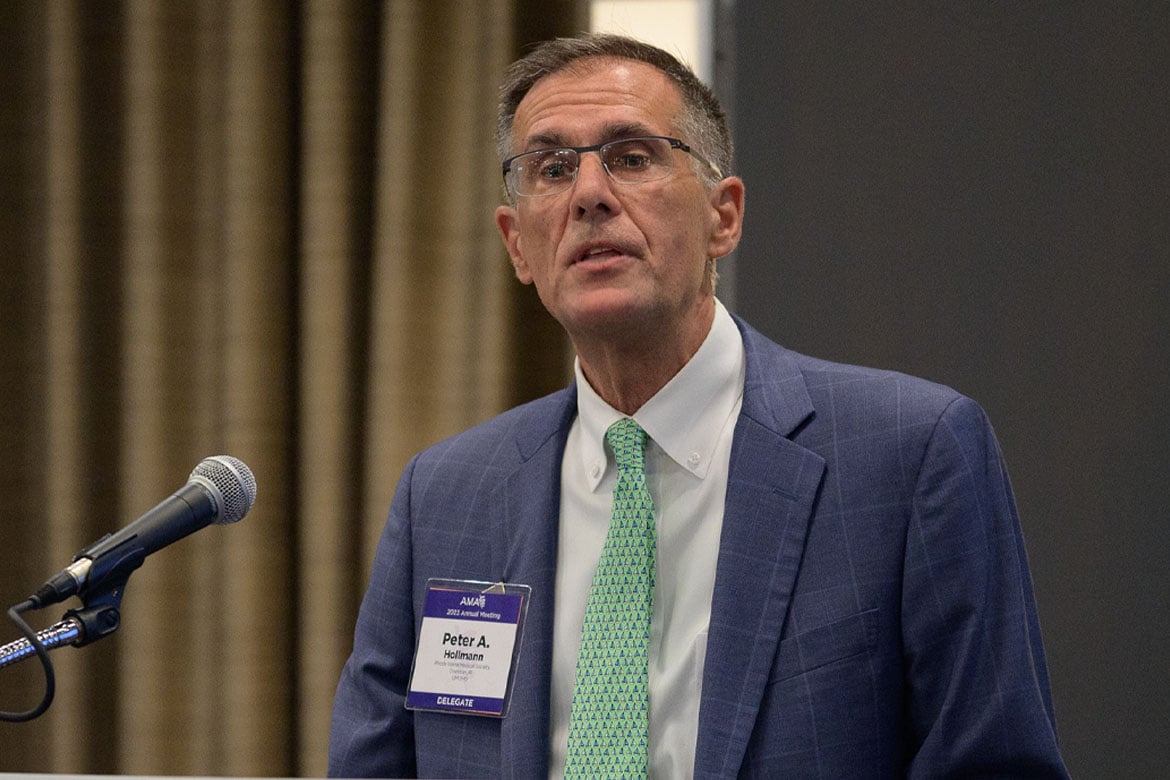The U.S. surgeon general’s office recently reported that social disconnection is as dangerous as smoking 15 cigarettes a day. The message is an important take-home point for physicians, according to AMA member and geriatrician Peter A. Hollmann, MD.
Identifying loneliness and social isolation, especially among older adults, calls for stepped up vigilance, said Dr. Hollmann, chief medical officer for Brown Medicine and an associate clinical professor at the Warren Alpert Medical School of Brown University.
In an education session moderated by Ved Gossain, MD, chair of the AMA Senior Physicians Section, Dr. Hollmann discussed the epidemiology of loneliness and social isolation as it relates to aging, the health effects of these afflictions, and the interventions available to physicians.
“Don’t assume you can tell who's lonely or not,” he advised the doctors attending the session, which took place during the 2023 AMA Annual Meeting in Chicago.
Do consider using a screening instrument, added Dr. Hollmann, a delegate for the Rhode Island Medical Society.
“Think about how someone might be isolated or lonely and what you may be able to do about it. Ask them what they think might be helpful and acceptable to them. And then advocate for resources in the community.”
At the Annual Meeting, the AMA House of Delegates took action to address loneliness, social isolation and mental health across the life span. Learn more.
The epidemiology of feeling alone
Loneliness is the perception of social isolation or the subjective feeling of being lonely. It’s a subjective thing: how someone feels. Social isolation is the objective lack or limited social contact with others, said Dr. Hollmann, referencing definitions from a National Academies of Sciences, Engineering, and Medicine report.
Certain risk factors may predispose a patient to having social isolation and loneliness.
Aging is associated with conditions that put people at higher risk for loneliness or social isolation. These may include mobility impairment, sensory deficits, cognitive dysfunction or incontinence, and loss of their social network, noted Dr. Hollmann.
The older-age cohort has the highest prevalence of social isolation. “Like so many things in our society, poverty, being a victim of discrimination, certainly having elder abuse, [or] trauma events at any time in your life will be a risk factor for loneliness,” said Dr. Hollmann.
Health effects of isolation
Loneliness and social isolation can affect physical health. People with these afflictions have increased risk of stroke and other cardiovascular diseases and dementia.
Mortality can be an outcome from these afflictions, said Dr. Hollmann. A chronic illness that keeps someone from seeing other people could lead to social isolation or loneliness.
“Likewise, that social isolation or loneliness can exacerbate the chronic illness and eventually have other health effects all the way up to mortality,” said Dr. Hollmann.
Reliable, affordable screening tools are necessary to help gauge these conditions. One good candidate is the UCLA Loneliness Scale, which uses 20 items to measure a person’s subjective feelings of loneliness and isolation, but also has a brief three-question version. Participants rate whether they often, sometimes, rarely or never feel that they have companionship, for example, or that they’re starved for company, or that no one really knows them well.
People may also benefit from a single question about how often they’ve felt lonely in the last month, said Dr. Hollmann.
How physicians can help
Older adults use the health care system regularly, which provides an opportunity for physicians to inquire about loneliness. Doctors should be aware of patients who might not have a support person to help them with medical decisions.
It’s important to look for underlying causes of social isolation or loneliness, such as mobility or hearing problems that can be addressed with medical treatments, he added.
Interventions may include working with patients to improve their social skills, enhancing their social supports, or addressing adaptive social cognition. Someone may feel they’re just not successful with people. But “you can learn skills,” said Dr. Hollmann.
Doctors can sometimes feel ineffective in helping their patients. This is why team-based care and sharing information about resources in a practice is so important in primary care, stressed Dr. Hollmann.




